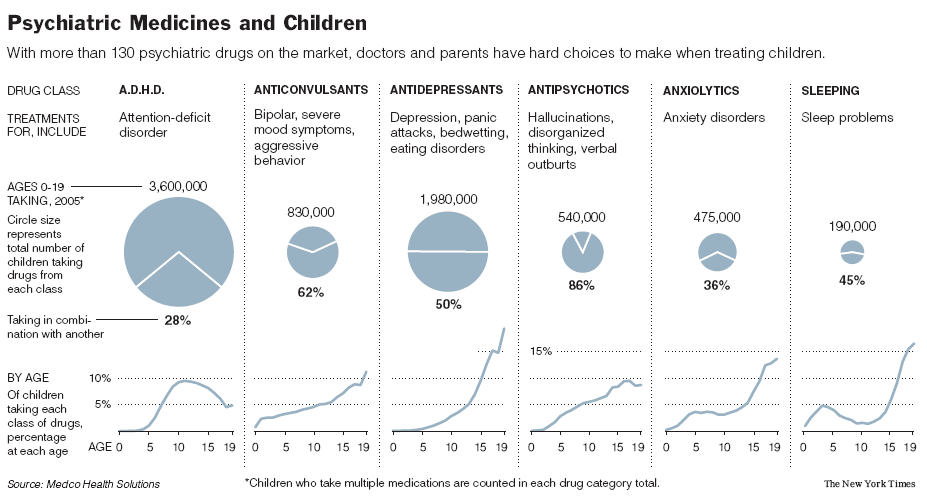“But I don’t think the insurance would pay for it if the F.D.A. didn’t decide that children should use it,” said Ms. Kehoe, who herself takes psychiatric medication.
In fact, the drug agency has specifically warned against the use of Lamictal, one of the drugs Stephen takes, in children who, like him, do not suffer from seizures because in 8 out of 1,000 children the drug causes life-threatening rashes.
Stephen and Jacob’s psychiatrist did not reply to telephone messages left with an office secretary on three different days. Ms. Kehoe said that she asked him to speak to this reporter but that he refused. The boys have had 11 psychiatrists over the last three years, according to prescription records, and many more before that, Ms. Kehoe said.
In interviews, Stephen and Jacob said they hated taking their drug cocktails.
“Everybody hates meds,” Jacob said.
Ms. Kehoe said her youngest son, Lucas Keck, was showing signs of attention deficit disorder and might soon need to start medication.
“I see the hyperness in him,” she said. “My pediatrician has said that he would venture to say that Lucas will be A.D.H.D.”
Stephen and Jacob were Lucas’s age — 6 — when they were given their first prescriptions.
The F.D.A. requires drug makers to prove that their drugs work safely before the agency will approve them for sale in the United States. But doctors can prescribe and combine approved medicines as they see fit. Such mixing is common in medicine but rarely studied by drug makers.
Psychiatrists started mixing psychiatric medications because the drugs were only moderately effective and often caused terrible side effects, said Dr. Steven E. Hyman, the provost of Harvard University and former director of the National Institute of Mental Health. “None of these drugs by themselves do an adequate job of controlling symptoms,” Dr. Hyman said.
If one drug failed, many psychiatrists assumed that two or more drugs used together might succeed. For decades, no one studied whether this was accurate. But in recent years, a trickle of studies have examined the question, with mixed results.
In studies in adults, some combinations of two drugs have been shown to work better than single medications to improve the symptoms of depression, obsessive-compulsive disorder and the mania associated with bipolar disorder. For example, a recent large government-financed study in adults, published in The New England Journal of Medicine, found that two antidepressants worked a bit better than one for adults who suffered from chronic, severe depression. But other studies have found no benefit from commonly prescribed drug combinations.
The use of two-medicine combinations in children is on much shakier ground. Even for single drugs, the effectiveness of some psychiatric medications in younger patients is questionable: most trials of antidepressants in depressed children, for instance, fail to show any beneficial effect. But hardly any studies have examined the safety or the effectiveness of medicine combinations in children. A 2003 review in The American Journal of Psychiatry found only six controlled trials of two-drug combinations. Four of the six failed to show any benefit; in a fifth, the improvement was offset by greater side effects.
“No one has been able to show that the benefits of these combinations outweigh the risks in children,” said Dr. Daniel J. Safer, an associate professor of psychiatry at Johns Hopkins University and an author of the 2003 review.
If the evidence for two-drug combinations is minimal, for three-drug combinations it is nonexistent, several top experts said.
“The data is zip,” Dr. Hyman said.
Many psychiatrists said that they turned to drug cocktails only in desperate circumstances. “If you’ve got a 15-year-old who is cutting up her arms, you’ve got a barn on fire and what are you supposed to do?” asked Dr. Alexander Lerman, a child and adolescent psychiatrist in New York, who said he rarely prescribed combinations.
Billy and Jackie Igafo-Te’o of Jackson, Mich., are among the desperate. In the last seven years, their 12-year-old son, Michael, “has been on just about everything you can put a child on,” Mrs. Igafo-Te’o said. He is now taking four medications: an antipsychotic, an anticonvulsant, an antidepressant and a sleep medicine.

